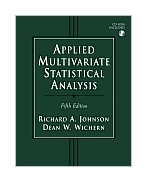|
||
• wydawnictwa polskie
• Zamów informacje o nowościach z wybranego tematu • kontakt
• Cookies na stronie |
APPLIED MULTIVARIATE STATISTICAL ANALYSIS + CDJOHNSON R. WICHERN D.wydawnictwo: PRENTICE HALL , rok wydania 2002, wydanie Vcena netto: For a junior/senior or graduate level course that explores the statistical methods for describing and analyzing multivariate data. Appropriate for experimental scientists in a variety of disciplines, this market-leading text offers a readable introduction to the statistical analysis of multivariate observations. Its overarching goal is to provide readers with the knowledge necessary to make proper interpretations and select appropriate techniques for analyzing multivariate data. NEW - Enhanced discussions of Multivariate Quality Control and Correspondence Analysis. Provides the student with a greater understanding of these essential topics. NEW - Eight new data sets - Includes bear data, lizard data, Egyptian skulls, welding data and more. Provides greater variety of data sets for instructors to assign. An abundance of examples and exercises based on real data - Over 50 real data sets are included on an enclosed computer disk. Provides students with the opportunity to duplicate the author's analyses, carry out the analyses, or analyze the data using suggested methods. Important results and formulas are highlighted and boxed. Directs students' attention toward key concepts. Applications of multivariate methods are emphasized. Makes the mathematics as accessible as possible for the student. A clear and insightful explanation of multivariate techniques. Assists students as they navigate difficult topics. Table of Contents I. GETTING STARTED. 1. Aspects of
Multivariate Analysis. 2. Matrix Algebra and Random Vectors. Some Basics of Matrix and Vector Algebra. Positive Definite Matrices. A Square-Root Matrix. Random Vectors and Matrices. Mean Vectors and Covariance Matrices. Matrix Inequalities and Maximization. Supplement 2A Vectors and Matrices: Basic Concepts. 3. Sample Geometry and
Random Sampling. 4. The Multivariate Normal Distribution. The Multivariate Normal Density and Its Properties. Sampling from a Multivariate Normal Distribution and Maximum Likelihood Estimation. The Sampling Distribution of X and S. Large-Sample Behavior of X and S. Assessing the Assumption of Normality. Detecting Outliners and Data Cleaning. Transformations to Near Normality. II. INFERENCES ABOUT MULTIVARIATE MEANS AND LINEAR MODELS. 5. Inferences About a Mean Vector. The Plausibility of ...m0 as a Value for a Normal Population Mean. Hotelling's T^2 and Likelihood Ratio Tests. Confidence Regions and Simultaneous Comparisons of Component Means. Large Sample Inferences about a Population Mean Vector. Multivariate Quality Control Charts. Inferences about Mean Vectors When Some Observations Are Missing. Difficulties Due To Time Dependence in Multivariate Observations. Supplement 5A Simultaneous Confidence Intervals and Ellipses as Shadows of the p-Dimensional Ellipsoids. 6. Comparisons of Several Multivariate Means. Paired Comparisons and a Repeated Measures Design. Comparing Mean Vectors from Two Populations. Comparison of Several Multivariate Population Means (One-Way MANOVA). Simultaneous Confidence Intervals for Treatment Effects. Two-Way Multivariate Analysis of Variance. Profile Analysis. Repealed Measures, Designs, and Growth Curves. Perspectives and a Strategy for Analyzing Multivariate Models. 7. Multivariate Linear Regression Models. The Classical Linear Regression Model. Least Squares Estimation. Inferences About the Regression Model. Inferences from the Estimated Regression Function. Model Checking and Other Aspects of Regression. Multivariate Multiple Regression. The Concept of Linear Regression. Comparing the Two Formulations of the Regression Model. Multiple Regression Models with Time Dependant Errors. Supplement 7A The Distribution of the Likelihood Ratio for the Multivariate Regression Model. III. ANALYSIS OF A COVARIANCE STRUCTURE. 8. Principal Components. Population Principal Components. Summarizing Sample Variation by Principal Components. Graphing the Principal Components. Large-Sample Inferences. Monitoring Quality with Principal Components. Supplement 8A The Geometry of the Sample Principal Component Approximation. 9. Factor Analysis and Inference for Structured Covariance Matrices. The Orthogonal Factor Model. Methods of Estimation. Factor Rotation. Factor Scores. Perspectives and a Strategy for Factor Analysis. Structural Equation Models. Supplement 9A Some Computational Details for Maximum Likelihood Estimation. 10. Canonical Correlation Analysis Canonical Variates and Canonical Correlations. Interpreting the Population Canonical Variables. The Sample Canonical Variates and Sample Canonical Correlations. Additional Sample Descriptive Measures. Large Sample Inferences. IV. CLASSIFICATION AND GROUPING TECHNIQUES. 11. Discrimination and Classification. Separation and Classification for Two Populations. Classifications with Two Multivariate Normal Populations. Evaluating Classification Functions. Fisher's Discriminant Function...¤Separation of Populations. Classification with Several Populations. Fisher's Method for Discriminating among Several Populations. Final Comments. 12. Clustering, Distance Methods and Ordination. Similarity Measures.
Hierarchical Clustering Methods. Nonhierarchical Clustering Methods. Multidimensional
Scaling. Correspondence Analysis. Biplots for Viewing Sample Units and Variables.
Procustes Analysis: A Method for Comparing Configurations. 767 pages Księgarnia nie działa. Nie odpowiadamy na pytania i nie realizujemy zamówien. Do odwolania !. |


